Posted on
March 28, 2018 by
Vineet Maheshwari
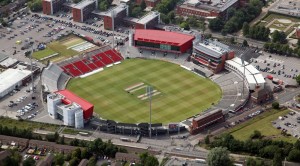 It’s true that most Americans don’t know where Old Trafford is but if you mention that name to billions of soccer fans, they not only know where the stadium is (Manchester, England) but what it looks like!
It’s true that most Americans don’t know where Old Trafford is but if you mention that name to billions of soccer fans, they not only know where the stadium is (Manchester, England) but what it looks like!
Some stadiums are simply part of the story, as much as the teams that play there. We were moved to research famous stadiums because so many of the headlines announcing that Usain Bolt, the great Olympic sprinter, would play in a charity soccer game for the benefit of Unicef mentioned that the game would be played at Old Trafford.
Fame
The primary criterion for inclusion on our list is fame rather than architectural uniqueness or seating capacity. We subjectively decided to exclude indoor stadiums because they simply aren’t famous now that the Montreal Canadiens, Boston Bruins, and Chicago Blackhawks play in newer stadiums. It would be as if we were writing about the most famous Las Vegas casinos and decided to include an online casino! (Full disclosure: we prefer playing at an online casino but Vegas is more famous).
Soccer Stadiums
There are no stadiums in the US that were built exclusively for soccer. In the rest of the world, the most famous stadiums are soccer stadiums first and foremost.
- Old Trafford has become famous because of the long-term success of Manchester United.
- Wembley Stadium is famous primarily for its name as the present Wembley is quite new, having replaced the old antiquated but big-hearted original Wembley. Today it is the home of the British National team.
- River Plate Stadium is rarely called by its formal name. It is 80 years old and is the iconic home of River Plate, one of the two premier soccer teams in soccer-mad Argentina.
- Not to be outdone by their arch-rivals to the south, Brazil also has its world-renowned stadium the Maracanã.
- Azteca, in Mexico City, is the largest stadium in the world that is used exclusively for soccer. At over 7000 feet above sea level and beset by the equally famous Mexico City pollution, it presents a massive challenge to all teams that come from much lower elevation to play there.
- San Siro is home to the two rival soccer teams from Milan, known as Inter and Milan. Since these two teams, along with Juventus from Turin, are perennially the top teams in Italy, San Siro has seen many classic soccer matches in both the local Italian top league and also in the European Cup.
- Camp Nou in Barcelona seats almost 100,000 rabid “Barca” fans. It was long considered an also-ran behind the Barnabeu in Madrid since Real Madrid was usually the top team in Spain. Camp Nou is now even better known because “Barca” is probably the most famous soccer club in the world.
- St. James Park in Newcastle is usually called The Cathedral on the Hill because it sits in the center of Newcastle and offers fans a great view of the city and countryside below. This stadium was built in 1880 and is famous despite featuring a team that doesn’t challenge for a championship in most years. Read the rest of this entry →
Tags: Sports Stadiums
Category
Sports Stadiums
Posted on
March 08, 2018 by
Dixie Somers
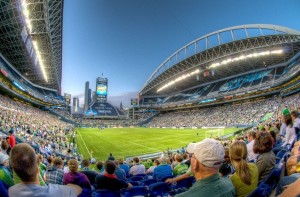 Sporting events are always quite popular no matter what age you are. Many communities offer these events for youth leagues, alumni events at schools or fun games as part of community days. However, without the right planning, a sporting event can quickly get off on the wrong foot and end up as a disaster. Whether you are organizing a Little League game or a charity sporting event for your community, use these tips to ensure that all aspects of the event are successful and that all of those present enjoy this time.
Sporting events are always quite popular no matter what age you are. Many communities offer these events for youth leagues, alumni events at schools or fun games as part of community days. However, without the right planning, a sporting event can quickly get off on the wrong foot and end up as a disaster. Whether you are organizing a Little League game or a charity sporting event for your community, use these tips to ensure that all aspects of the event are successful and that all of those present enjoy this time.
Choose a Venue
First, you must consider where you want to hold your event. To determine this, you will need to think about what time of year it is, what the weather will be like, how many people will need to be seated at the event and what age groups are going to be represented. You should also choose a venue with appropriate bathroom facilities and possibly locker rooms or dressing areas depending on the event to be held there.
Add Concessions
Concessions can make a good event great and are particularly important for larger and lengthier events. Consider seeing if local restaurants or ice cream stores in your area are willing to bring a truck to sell concessions at the venue. If you are hosting your event in an indoor facility, it may be easier to get concession stands incorporated. Read the rest of this entry →
Tags: Sports Stadiums
Category
General, sports management
Posted on
December 09, 2017 by
Jayson Goetz
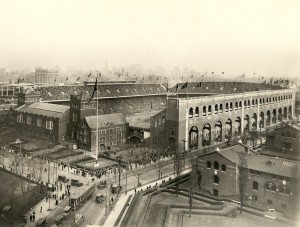
Franklin Field
When most Americans relied on candles to see and washed clothes by hand, the first sports stadium was being laid brick by brick. Now there are more than 200 stadiums in the country, and some come with swimming pools and zip lines. Those interested in original sports stadiums should check out the 10 oldest stadiums still in use today in the United States:
1. Franklin Field
This stadium was built in 1895 for the first running of the track and field competition known as the Penn Relays. It holds the record for many firsts such as the nation’s first scoreboard, the first stadium to have an upper deck of seats and the first to broadcast a football game on the radio and on television. The National Collegiate Athletic Association recognizes Franklin Field as the oldest stadium still operating for football.
2. Harvard Stadium
This stadium was an architectural feat at the time of its construction in 1903. Led by former Civil Engineering professor Louis Johnson, the stadium’s design was the first vertical structure to use reinforced structural concrete. The material was previously only used in horizontal designs such as flooring. Many people were skeptical of the stadium’s design. It was believed that it wouldn’t hold the weight of the crowds or last through the cold New England winters. But the stadium still stands today and it was designated a National Historic Landmark in 1987. Read the rest of this entry →
Tags: fenway parkFranklin FieldHarvard StadiumIndianapolis SpeedwayRose BowlSports Stadiums
Category
Baseball, Football, Indianapolis 500, Jayson Goetz, Sports History, Sports Stadiums
Posted on
September 27, 2017 by
Dixie Somers
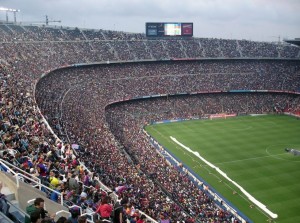 Few things are as eye-catching as a sports stadium. Enormous, radiant, and all-encompassing, these hulking structures are nothing short of miracles begotten by modern architecture. As one might expect, these Goliaths of entertainment and popular culture have a good number of interesting stories and factoids attached to their construction and histories. Listed below are some of the most striking we could find.
Few things are as eye-catching as a sports stadium. Enormous, radiant, and all-encompassing, these hulking structures are nothing short of miracles begotten by modern architecture. As one might expect, these Goliaths of entertainment and popular culture have a good number of interesting stories and factoids attached to their construction and histories. Listed below are some of the most striking we could find.
1. AT&T Stadium
Familiar to any fan of American Football, the AT&T Stadium is as recognizable as it is gargantuan. The stadium has a carrying capacity of nearly eighty-thousand, an impressive number by any standard. One of the most thought provoking aspects of the stadium is its simple architectural style. While similar structures pride themselves on complex hallways and building styles, the AT&T Stadium stands out because, in reality, it’s just a room. An unbelievably large room, yes, but a room nonetheless. Additionally, the stadium is a master stroke of electrical design as well. Created by hundreds of talented designers, recipients of electrical engineering master degrees, and other such professionals, the stadium is unrivaled in its design and efficiency.
2. National Aquatic Center (China)
The National Aquatic Center is a world-famous stadium for a number of reasons. For one, it housed the legendary records put in place by the world-renowned Olympian Michael Phelps. For another, it’s an unquestionable architectural marvel. Often called the “Water Cube,” the stadium is a modest size. Size is far from a stadium’s only quality, however, and the National Aquatics Center proves this in its fame. The Stadium has spawned a good number of ‘me-too’ stadiums in its native China, making it the countries most renowned Athletics center by a wide margin. Read the rest of this entry →
Tags: Sports Stadiums
Category
General, Outdoor Activities, Sports Technology
Posted on
October 25, 2016 by
Daniel Bailey
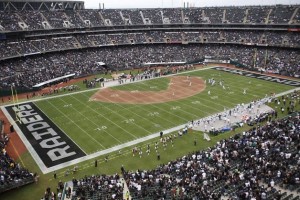
Oakland Alameda Stadium is currently the only stadium used for both the NFL and Major League Baseball.
If you’re a big football fan, you most likely already know that several NFL and college teams share the same stadium. If you aren’t aware, there are 13 NFL teams that still share their football stadiums. While the NY Giants and Jets play on the same field, the Oakland Raiders actually share their stadium with the Oakland A’s. This is the only NFL team that still shares a stadium with an MLB baseball team. So how is this possible? The term used when each team is prepping its field for game day is, “flipping the field.”
Flipping a field isn’t an easy task. It takes a lot of time, money and labor to make sure that each stadium is ready before the teams run onto the field. It can take 12 crew members a whole work day to get the field ready for the team’s next game. This isn’t cheap either; it can cost up to $250,000get all of this done.
To lay it all out, Equipsupply created an infographic that goes into the behind-the-scenes details of what it takes to get these football fields ready for each and every game day. So next time you’re prepping for your tailgate festivities, you might think about all the work that it took to get your favorite team’s football field ready for kick off. Read the rest of this entry →
Tags: Oakland Alameda StadiumSports Stadiums
Category
Baseball, Football
 It’s true that most Americans don’t know where Old Trafford is but if you mention that name to billions of soccer fans, they not only know where the stadium is (Manchester, England) but what it looks like!
It’s true that most Americans don’t know where Old Trafford is but if you mention that name to billions of soccer fans, they not only know where the stadium is (Manchester, England) but what it looks like!


